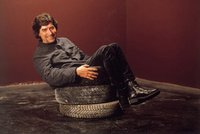In 1968 he began studies at the University of Granada, but gave them up soon after to go into exile in London, where he lived as a squatter and became involved with other exiles in cultural and theatre movements. In 1975 he started to write songs and play gigs. In 1977, after the dictatorship had ended, he returned to Spain.
Finally, in 1978, he brought out his first disc, Inventario, which earned him a number one with the song ‘Pongamos que hablo de Madrid'. He then released Malas compañías and the live album La mandrágora. His favourite characters are out-and-out losers: drunks, prostitutes, neighbourhood crooks... He likes talking about things that break the rules and against what is considered ‘morally correct'. In 1983 he brought out Ruleta rusa, followed two years later by Juez y parte. His political concerns saw him campaigning against Spain's entry into NATO. He worked with Viceversa on the disc Joaquín Sabina y Viceversa. In 1987 he released Hotel, dulce hotel, which became a huge bestseller in Spain. He repeated this success the following year with El hombre del traje gris, which enabled him to go on a long South American tour. In 1990 he brought out Mentiras piadosas and in 1992, Física y química, with which he achieved splendid results and which enabled him once more to cross America. He later brought out the discs Esta boca es mía and Yo, mi, me, contigo. His work 19 días y 500 noches, despite the obvious effects of his excesses with tobacco, is full of great songs. After recovering from a serious illness, he brought us a new studio disc, Dímelo en la calle. Joaquín Sabina is the author of two books: Ciento volando de catorce, a collection of sonnets published in 2001, and Con buena letra, published in 2002, with the words of his songs; he is also co-author of Reflexiones sobre José Tomás, also published in 2002.
Participants
- Home
- Participants
- Joaquín Sabina
Joaquín Sabina
(Úbeda, Jaén, 1949)- Takes part in


